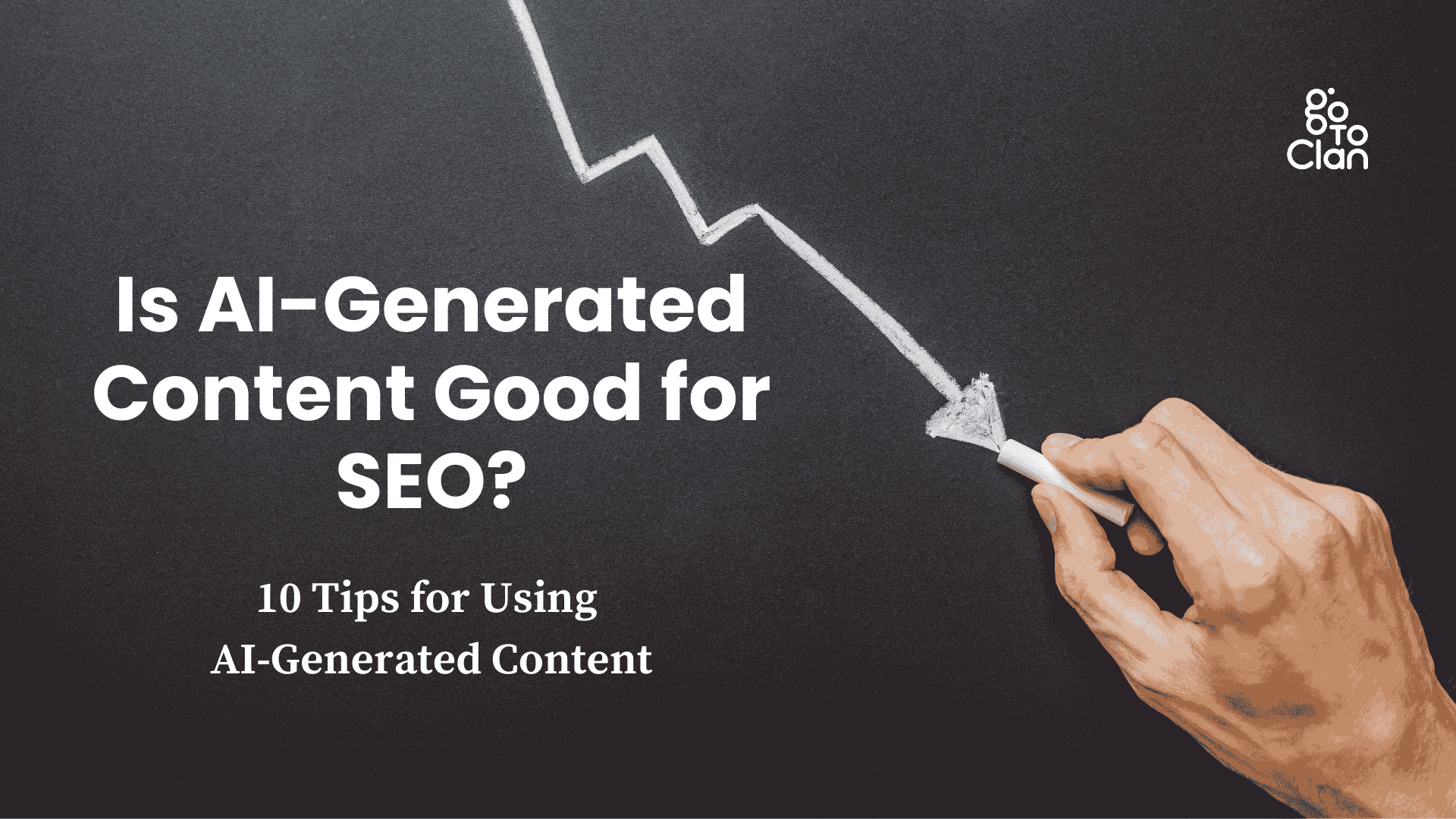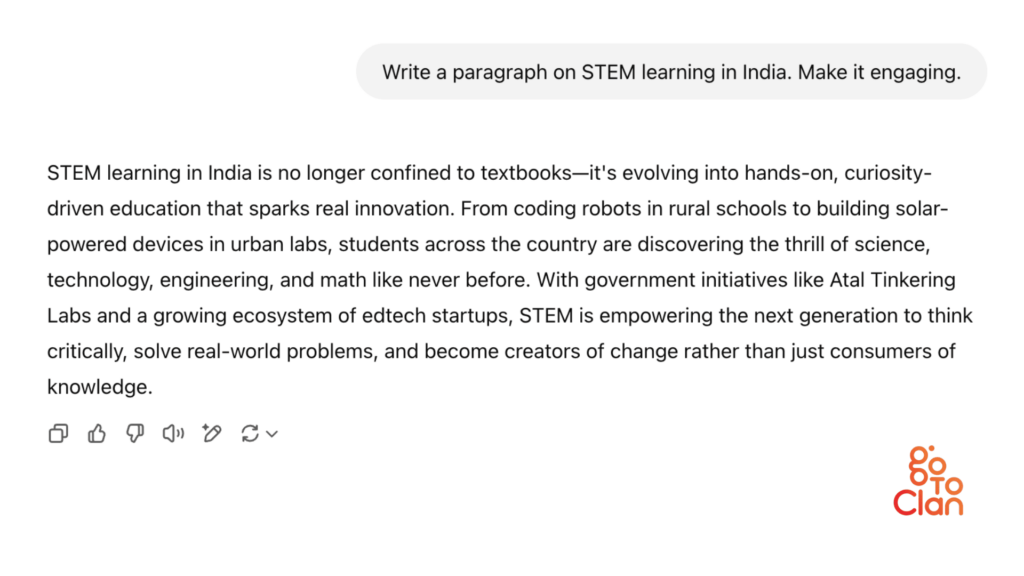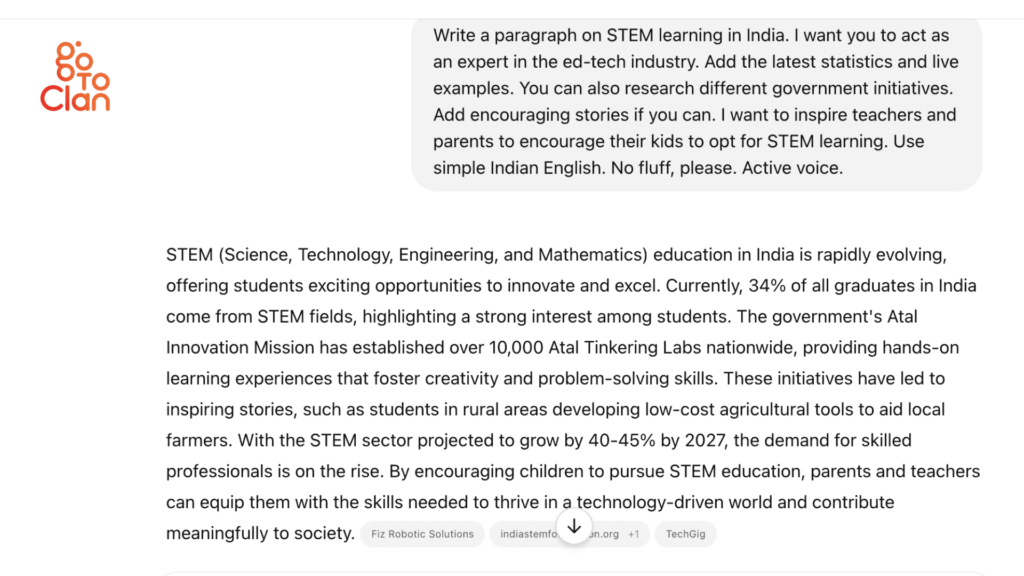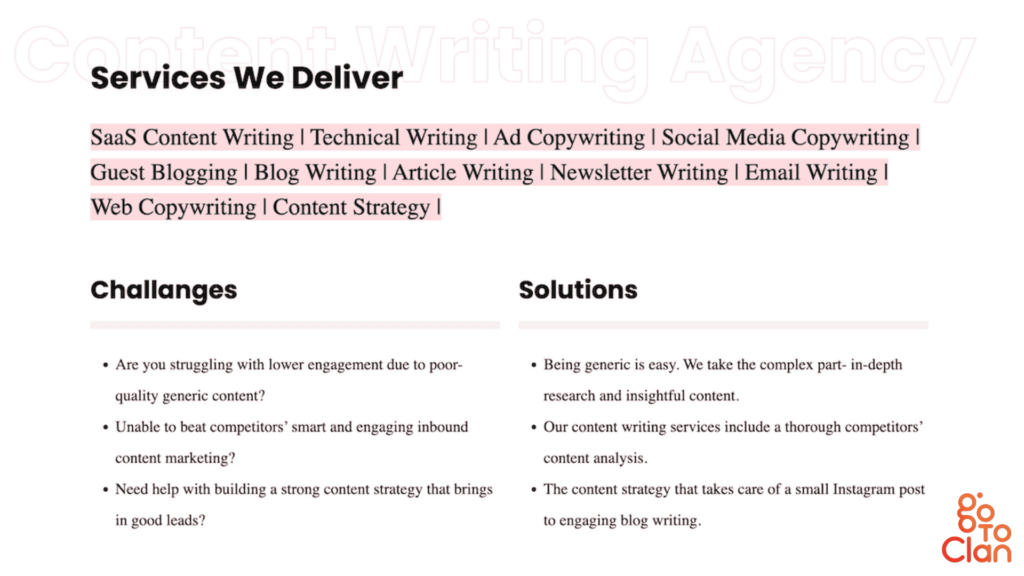
Is AI-generated content good for SEO? The short answer is yes. You must have read multiple blogs claiming that AI-generated content is good, but you need to consider a few tips. For me, AI-generated content is bad for SEO if you rely on it completely. Why do I say so? Well, I have been crafting content for over 8 years, and I strongly believe that AI-generated content can harm your SEO ranking. I will explain why.
According to Salesforce, 61% of employees prefer using AI to generate content. That’s huge, right? Many companies have noticed a decline in SEO ranking after publishing AI-generated content.
Our client came to us after a huge loss- a health tech company boosted content generation by 4x with the help of AI. The company soon noticed a decline in ranking, and in a mere 2 months, its ranking dropped by 40%! Want to know what went wrong? Scroll down for a detailed answer.
Table of Contents
Is AI-Generated Content Good for SEO?
Remember how, before 2023, we used to sit together, brainstorm, and list blog topics? How did we build a team of skilled content writers? Writers used to research a crucial topic for hours, sometimes days, and write detailed blog posts. But now, AI does everything.
AI is an exceptionally commendable innovation that is smart, prompt, and improving daily. Google has clearly stated that it does not mind when companies post AI-generated content. Still, businesses have a question: Is AI content bad for SEO? Google can flag your content and reduce your ranking if you avoid these points. Google has problems when:
1. No Human Touch-
I’ll be honest; I can read the first couple of lines and guess whether the content is AI-generated or human-written. Whenever I come across an AI-generated blog, I immediately jump off. Even if the blog holds a lot of information, I can read a couple of blogs and get that same information without having to read a mundane blog.
Any content- blog, email, or even a newsletter- must be engaging enough. The human touch matters. Everyone likes it when they talk to a person instead of a robot. Believe me, blogs are a great source of communication.
2. Lack of Creativity-
Be it a professional b2b blog or a travel diary, creativity is a must. If you are passing a message passed by 10 people already, your creativity can make you stand out from the crowd. Repeating the points, no live examples, no puns, no humor, and no value-addition- your blog can look like this if you completely rely on AI.
3. Misinformation Risk-
This is one of the major concerns. AI can misinterpret facts and write misleading statements. Businesses must understand that any AI content generation tool like ChatGPT or Claude is nothing but a robot who is still learning. Any wrong information can lead to shattered trust and the loss of valuable subscribers.
4. Where Is EEAT?
How does AI content affect SEO? Because businesses often forget about EEAT. Experience, Expertise, Authoritativeness, and Trustworthiness (EEAT) is Google’s framework for assessing content. EEAT matters even more when you are writing about a topic where accuracy and reliability are crucial.
Let’s say you are running a financial advisory company and are starting to publish AI-generated content.
Experience:
The content may lack real-life financial scenarios, case studies, or personal insights that show practical knowledge.
Expertise:
AI might produce generic advice without certifications, credentials, or expert author bios, weakening perceived expertise.
Authoritativeness:
If recognized professionals don’t back articles or don’t reference credible sources, they won’t establish authority in the field.
Trustworthiness:
Misinformation, outdated data, or lack of financial disclaimers can damage trust, which is especially critical in finance, where accuracy is vital.
Be it monotonous content or lack of engagement, AI cannot match a subject matter expert’s proficiency. If you wish to use AI-generated content for SEO, you must stop relying completely on AI and start following the below-mentioned tips:
10 Tips for Using AI-Generated Content for SEO
Though Google has clearly stated that AI-generated content can help your business in organic rankings, it has some underlying points you should know. I have tried to explain those points in simple words. So, let’s start.
1. Use AI for Blog Outline
Being a writer, I can totally understand how tiring it is to finalize a blog outline where you achieve a systematic story flow. You can take AI’s help. AI can help you create an excellent storytelling format, and you can start writing about each point in detail.
Having a defined outline can save you from writing vaguely and help you focus on important points. It not only reduces writer’s block but also boosts SEO with keyword-focused sections.
Prompt You Can Use- “Generate an engaging outline for the blog topic [topic name]. Here are the important keywords you can add to the headings: [keywords]. The blog must have an engaging story and cover unique points not discussed in these reference blogs- [reference blog links]
There are multiple cool AI content outline generators available online:
2. Use AI for Research
I know this can backfire, but there is a trick. Taking the help of AI tools in the research phase is a smart move. Tell me, how do you start your research journey? Adding stats and real-life examples can boost your blog’s credibility. You all already know this, right? So you go to Google and look for such news and blogs. Instead of scrolling through 5-6 pages to find the right news article to get ‘shocking statistics’, you can simply ask ChatGPT about what you are looking for.
For instance, you are writing a blog about Atal Tinkering Lab (Indian education’s new revolution). You want to know how many schools have already been using ATLs, how many schools have successfully participated and won in ATL competitions, how many students have received special scholarships, etc. You can simply educate ChatGPT about ATL by giving it a few ATL and AIM links and asking it to look for such statistics.
But, what if it shows wrong data? There is a trick. ChatGPT 4o is designed to conduct in-depth research and provide valid source links as well. You can simply go to the source links and confirm whether the information is valid or not.
Another benefit of using AI for research is that it can save hours of work, allowing you to focus on improving your blog’s engagement. AI also identifies trends and recent insights that can be added to your blog to boost its relatability.
Prompt You Can Use- “Act as a research assistant. Help me gather the latest data, trends, and expert insights on [topic]. Include key stats, credible sources, and recent developments from the last 12 months.”
3. Teach It First
You are an expert, so act like one. AI is not a person who would gauge your thoughts through your tone or body language or use its own experience to generate quality content. It needs proper guidance.
Let’s say you hire an intern. You go to the office, see your intern working on something, give him/her an on-the-fly task, and head to your cabin. The intern, with limited experience and knowledge, completes the task accordingly. You check the results and start scolding the intern. Whose fault is it- yours or the intern’s? For a good blog draft, you must provide essential data first.
A good, detailed prompt can do miracles. Feed data first: news links, blog links, expected output, etc. You can also offer PDFs and research papers to educate your AI tool. Once the AI tool has gathered all the information, you can write a systematic prompt highlighting details.
For example-


4. Offer Your Brand Guideline Book
Every small to large-scale enterprise must have a brand guideline book. A brand guideline book is your brand’s biography. It has all the minute details about your company and how you want the brand to be perceived.
Have you heard of the Brand Essence Wheel? It is an excellent way of defining your brand’s identity. Whether you want people to look at your brand as a luxury brand, a tech-advanced brand, or a trustworthy brand, it all depends on what you feed into the Brand Essence Wheel.
You can offer this Brand Essence Wheel to your favorite AI tool along with your brand guideline book to grasp your brand’s tone and voice. Every brand has a set tone. For instance, every sports brand has an energetic and motivational tone. A similar energy should be reflected in your blogs as well.
Inconsistency in a brand’s tone can hamper blog engagement. We don’t want that! Instead of explaining the expected tone in a lengthy prompt, you can enter your brand guideline book and ask the AI tool to memorize it for future reference.
5. Use AI for Drafts
Never copy-paste AI-generated content directly. Make sure you make some improvements to the blog before publishing. You can edit the introduction and add a hook, you can add emotions, or you can add examples to simplify your point.
The effort of changes directly depends on the quality of the AI-written blog. Google prioritizes excellent quality blogs- blogs that help. Always read the entire blog and point out areas that need improvement. For instance, you have given a detailed prompt to Claude, and it has generated a detailed blog, but you are not happy with the conclusion. You can always change it to more natural content with inbound information.
AI is here to help and not replace your work. Look at it as a source of assistance and do not delegate entire tasks to AI.
“Treat AI as your assistant.”
6. Use AI to Think Outside the Box
You can use AI to play the devil’s advocate. AI is great at supporting your argument, but it’s even more powerful when you ask it to challenge you. By prompting AI to argue the opposite side, you uncover blind spots, common objections, or misconceptions your audience might have.
For example, if your blog promotes AI-generated content for SEO, ask the AI:
“What are some reasons AI-generated content could harm SEO rankings?”
The AI may respond with points like a lack of originality, failure to meet E-E-A-T guidelines, or Google’s spam policy updates. This allows you to build counterarguments in your blog, offer solutions, and make your content more robust. It creates balance, earns the reader’s trust, and improves the overall depth of your article.
When you publish a blog, readers may question certain points or challenge your views in the comments. You can use AI to identify these gaps or confusion and update your content to provide clearer explanations or additional context.
7. Feed Google Analytics Data
Most people give generic prompts to AI. But if you feed it your Google Analytics data, such as your top-performing blog headlines, keyword-rich queries, or bounce rate insights, it becomes 10x more relevant.
What is your objective in writing blogs? Getting quality traffic, right? If you want more and more people to visit your blogs and interact with your website, you need to brainstorm around apt topics. Feeding Google Analytics data can bring many good changes.
Tell AI about your top 10 high-traffic blogs. Input the titles and keywords. It will analyze the blog structures and identify more such topics. You can also ask AI what made those blogs gain good ranking. Based on AI’s feedback, you can amend your content strategy.

For instance, input something like:
“Here are my five most clicked blog titles from Google Analytics. Based on this pattern, suggest new blog topics or formats that can perform equally well.”
You can also combine Google Analytics data and AI to optimize your poorly performing blogs. Let’s say I have written a blog that I feel is good, but it is not gaining good traffic. I can feed the blog link and ask AI to identify what can be improved. Such crucial insights can boost your SEO game.
For instance, input something like:
“Users are dropping off this page in 30 seconds. What could I add to improve engagement?”
This makes AI act like a personalized strategist. It uses real user behavior to tailor ideas, increasing your chances of higher engagement, better SEO performance, and meaningful content creation.
8. Repurpose Your Blogs With AI
You can use AI tools like Claude and ChatGPT to write blog repurposed posts. There is a standard process of posting blogs on social media to increase the reach. This is another tricky part, as keywords do not work in social media.
Add an intriguing hook to make people stop scrolling and read the post. After writing a detailed blog of 1500-2000 words, you can ask AI to generate such blog repurpose posts with an engaging hook. It can be a shocking and bold statement or a question.
Prompt You Can Use- “Go through this blog and understand the message. The TG is [user persona]. Write a LinkedIn post with a shocking hook. The post should be short and to the point. It should ensure answers to many crucial questions. Maintain the brand tone.”
9. Let AI Act as an Editor
Whether you have a professional content editor on your team or not, AI can act as your content editor. Just finish the first draft of your blog and share it with your AI tool. Ask the AI tool to go through it and identify errors.
You can use it to detect grammatical errors, inconsistencies in tone, factual errors, etc. Being a writer, I can tell you one thing for sure. We writers have a lot to say, always! We are always ready to discuss, no matter what the topic is. Hence, there is a good chance that writers add many irrelevant points to the blog or change the entire blog direction in one line!
AI can be a good support to identify such problems. It can also suggest better content wherever there is a dull moment in your blog. You can also ask AI to scan as a Marketing Expert and identify SEO problems in your blog piece.
Prompt You Can Use- “Act as a content editor and marketing expert. Review the blog below for grammar, clarity, SEO, and engagement. Suggest improvements wherever needed.”
10. Use AI to Spy on Your Competitors
Another important practice in SEO is to check your competitors’ moves. If your competitor has a better domain rating and traffic than your website, you can reverse engineer its strategy using AI.
Simply ask AI to compare your website with a competitor’s and identify the gaps. It will highlight what you’re missing, what needs improvement, and where you’re performing well. More importantly, it can suggest how to double down on your strengths and take strategic actions to stay ahead of the competition.
You can also ask AI to analyze their top-performing pages, keywords they rank for, backlink sources, and even their content structure. This gives you a clear roadmap of what’s working in your niche.
For example, if a competitor consistently ranks high with in-depth how-to guides, AI can suggest similar content formats for your site. It can also recommend missing keywords, internal linking opportunities, and content angles they haven’t explored yet. With this intel, you don’t just copy; you compete smarter, filling gaps they’ve missed and optimizing areas where you already have an edge.
Prompt You Can Use- “Act as an SEO strategist. Compare my website [yourdomain.com] with a competitor’s website [competitor.com]. Analyze and identify content gaps, keyword differences, backlink profiles, and traffic sources. Tell me:
- What is my competitor doing better in terms of content, SEO, and structure?
- What are my strengths that I should double down on?
- Which keywords am I missing that they rank for?
- What content formats or topics are driving traffic to their site?
- Suggest 5 actionable strategies I can use to close the gap and improve my SEO performance.”
Final Words
Is AI-generated content good for SEO? Yes.
Is AI content bad for SEO? Depends on how you use it.
Hope you enjoyed these tips for using AI-generated content for SEO.

If you think AI can replace your team of content writers or save you the cost of hiring a Content Writing Agency in India, you can think twice. Even using AI needs a whole different level of expertise.
Want good old content writing services?
Engaging and Informative
At Go To Clan, I have built a team of content writers who can deliver quality content even if Sam Altman decides to shut down OpenAI 😀
If you want a team of experienced content writers with a complete understanding of 2025’s SEO guidelines, you can ping us at coffee@gotoclan.com.